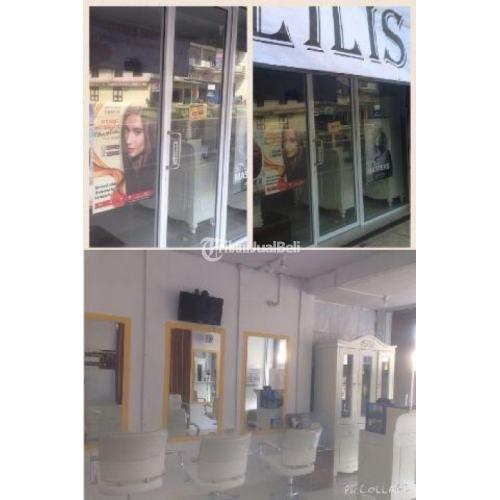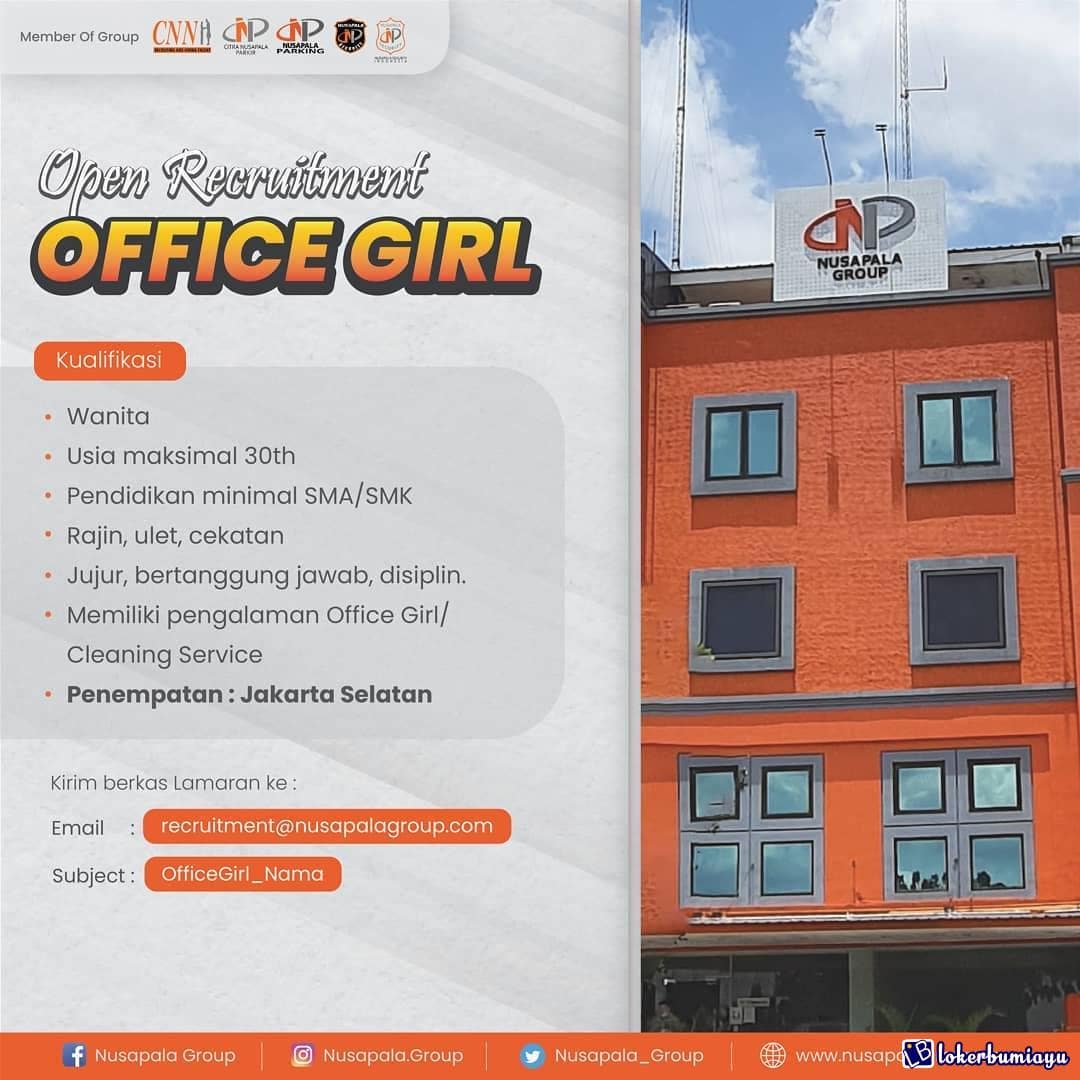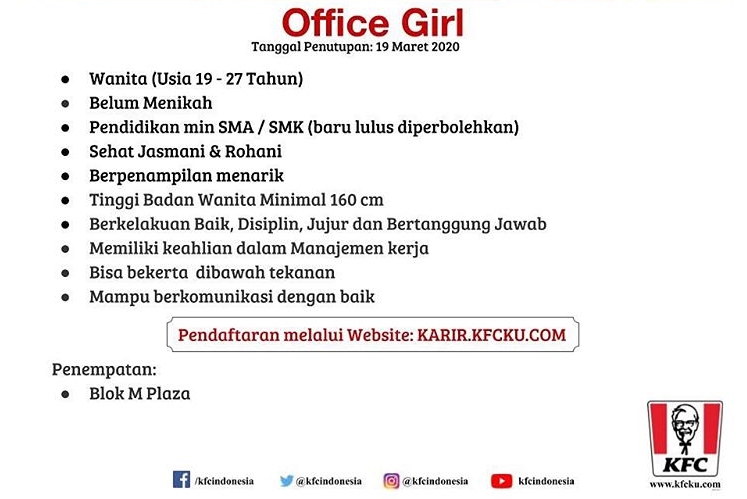40 lowongan kerja office girl di bank
mid-13c., "a post in government or administration, an employment to which certain duties are attached, secular position of authority or responsibility," from Anglo-French and Old French ofice "place or function; divine service" (12c. in Old French) and directly from Latin officium "a service, kindness, favor; an obligatory service, official duty, function, business; ceremonial observance" (in Medieval Latin, "church service"). The Latin word was contracted from opificium, literally "work-doing," from ops (genitive opis) "power, might, abundance, means" (related to opus "work," from PIE root *op- "to work, produce in abundance") + combining form of facere "to make, to do" (from PIE root *dhe- "to set, put"). Of ecclesiastical positions from late 14c. From c. 1300 as "official employment" in general, also "ecclesiastical service or mass; the prescribed order and form of church services." Meaning "building or room for conducting business" is from late 14c. Meaning "a government or civic department" is from mid-1 c. 1300, gyrle "child, young person" (of either sex but most frequently of females), of unknown origin. One guess [OED] leans toward an unrecorded Old English *gyrele, from Proto-Germanic *gurwilon-, diminutive of *gurwjoz (apparently also represented by Low German gære "boy, girl," Norwegian dialectal gorre, Swedish dialectal gurre "small child," though the exact relationship, if any, between all these is obscure), from PIE *ghwrgh-, also found in Greek parthenos "virgin." But this involves some objectionable philology. Liberman (2008) writes: Girl does not go back to any Old English or Old Germanic form. It is part of a large group of Germanic words whose root begins with a g or k and ends in r. The final consonant in girl is a diminutive suffix. The g-r words denote young animals, children, and all kinds of creatures considered immature, worthless, or past their prime. Another candidate is Old English gierela "garment" (for possible sense evolution in this theory, compare brat). A former folk-etymology der
word-forming element of Greek origin meaning "through; in different directions; between," also often merely intensive, "thoroughly;" the form of dia- before vowels.
Lowongan kerja office girl di bank
1580s, "to form a bank or slope or rise," from bank (n.2). Meaning "to rise in banks" is by 1870. That of "to ascend," as of an incline, is from 1892. In aeronautics, from 1911. Related: Banked; banking. originally in billiards, "to make (the cue ball) touch the cushion (bank) of the table before touching another ball," by 1909, from a specialized sense of bank (n.2); probably abstracted from bank-shot (n.), which is attested by 1889. Related: Banked; banking. "financial institution," late 15c., originally "money-dealer's counter or shop," from either Old Italian banca or via French banque (itself from the Italian word), both meaning "table," from a Germanic source (such as Old High German bank "bench, moneylender's table"), from Proto-Germanic *bankiz- "shelf," *bankon- (see bank (n.2)). The etymonlogical notion is of the moneylender's exchange table. As "institution for receiving and lending money" from 1620s. In games of chance, "the sum of money held by the proprietor or one who plays against the rest," by 1720. Bank holiday is from 1871, though the tradition is as old as the Bank of England. To cry all the way to the bank was coined 1956 by U.S. pianist Liberace, after a Madison Square Garden concert that was panned by critics but packed with patrons.
Lowongan kerja office girl di bank. word-forming element of Greek origin meaning "two, double, twice, twofold," from Greek di-, shortened form of dis "twice," which is related to duo "two" and cognate with bi-, from PIE root *dwo- "two." In chemistry it indicates a compound containing two units of the element or radical to which it is prefixed. word-forming element of Latin origin meaning "apart, asunder," the form of dis- before certain voiced consonants. As des- was a form of dis- in Old French, some Middle English words have forms in both de- and di-; compare devise, which really belongs to di- and is related to divide. "to act as a banker," 1727, from bank (n.1). As "to deposit in a bank" from 1833. Figurative sense of "to rely on" (i.e. "to put money on") is from 1884, U.S. colloquial. Related: Banked; banking; bankable. "natural earthen incline bordering a body of water," c. 1200, from a Scandinavian source such as Old Norse *banki, Old Danish banke "sandbank," from Proto-Germanic *bankon "slope," cognate with *bankiz "shelf" (see bench (n.)). As "rising ground in a sea or rover, shoal," from c. 1600. As "bench for rowers in an ancient galley," 1590s. There probably was an Old English cognate but it is not attested in surviving documents. The nasalized form likely is a variant of Old Norse bakki "(river) bank, ridge, mound; cloud bank," cognate with Swedish backe, Danish bakke "hill, rising ground."
"financial institution," late 15c., originally "money-dealer's counter or shop," from either Old Italian banca or via French banque (itself from the Italian word), both meaning "table," from a Germanic source (such as Old High German bank "bench, moneylender's table"), from Proto-Germanic *bankiz- "shelf," *bankon- (see bank (n.2)). The etymonlogical notion is of the moneylender's exchange table. As "institution for receiving and lending money" from 1620s. In games of chance, "the sum of money held by the proprietor or one who plays against the rest," by 1720. Bank holiday is from 1871, though the tradition is as old as the Bank of England. To cry all the way to the bank was coined 1956 by U.S. pianist Liberace, after a Madison Square Garden concert that was panned by critics but packed with patrons. originally in billiards, "to make (the cue ball) touch the cushion (bank) of the table before touching another ball," by 1909, from a specialized sense of bank (n.2); probably abstracted from bank-shot (n.), which is attested by 1889. Related: Banked; banking. 1580s, "to form a bank or slope or rise," from bank (n.2). Meaning "to rise in banks" is by 1870. That of "to ascend," as of an incline, is from 1892. In aeronautics, from 1911. Related: Banked; banking.

Pembukaan Lowongan Untuk Posisi Office Boy Dan Office Girl Wilayah Depok Di Kota Depok Jawa Barat Jualo Com

Lowongan Kerja Jakarta Office Boy Lokerjakarta Id Adalah Situs Online Yang Menyajikan Informasi Lowongan Kerja Di Jakarta Bogor Depok Tangerang Bekasi Dan Lowongan Bumn Terbaru





































0 Response to "40 lowongan kerja office girl di bank"
Post a Comment